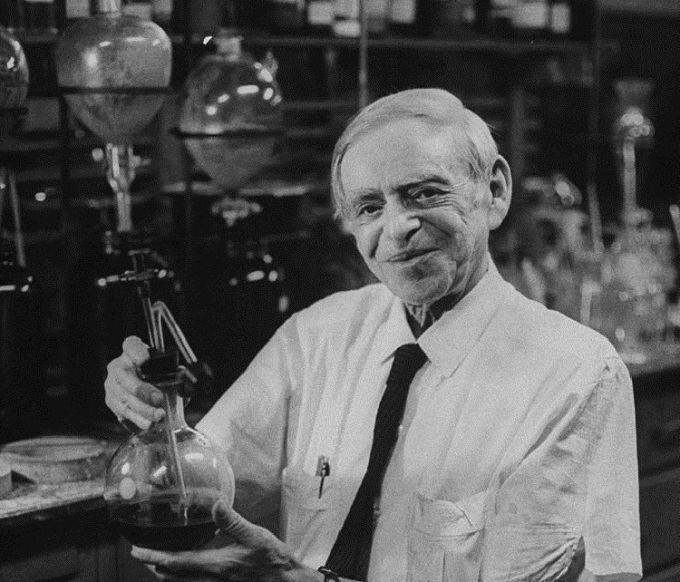In the early 20th century, Casimir Funk put forward a revolutionary idea - diseases can appear due to a lack of certain essential nutrients.

Biochemist Casimir Funk, the "father" of vitamins. Photo: American Institute of Polish Culture
The name vitamin, originally vitamine, is a combination of the Latin words "vita" (life) and "amine" (a chemical compound containing nitrogen). The name was coined by Polish-American biochemist Casimir Funk in 1912, when he discovered that the cause of certain diseases was a deficiency of certain components in the diet.
This discovery, along with the research that followed over the next five decades, including contributions to 140 technical papers and 30 reviews and studies, earned Funk the title of “Father of Vitamins,” and established the essentiality of vitamins to human health. Funk’s work led to the discovery of 13 vitamins in 35 years, all of which are known to man today. This saved countless lives, and left a lasting mark on the fields of biochemistry and nutrition.
Casimir Funk was born in Warsaw, Poland, in 1884. Funk was the son of a Polish physician, and his family wanted him to become a physician. However, he aimed for a doctorate in chemistry at the University of Berne, Switzerland, which he achieved in 1904, at the age of 20. Funk then became a biochemist at the Pasteur Institute in Paris. He went on to work at the Wiesbaden City Hospital in Germany, the University of Berlin, and the Lister Institute in London. He emigrated to the United States in 1915 and held several important positions in universities and industry in New York.
In 1912, Funk discovered that four diseases—Beriberi (which can affect the circulatory and nervous systems), Scurvy (which causes teeth and gums to rot), Pellagra (which leads to complications such as dermatitis), and Rickets—were all caused by deficiencies in certain nutrients. "We will talk about the vitamins Scurvy and Beriberi, which are substances that are the preventers of these particular diseases," Funk wrote in the study.
The idea that disease could be caused by a lack of essential nutrients, not just by infection or toxins, was revolutionary at a time when the germ theory of disease was dominant, which held that certain diseases originated from disease-causing microorganisms. Funk, however, proposed that certain vitamins were essential in the human diet and that even very small amounts could help prevent and treat disease.
In 1912, he published his research "The Causes of Deficiency Diseases" in the Journal of State Medicine . In 1914, he wrote a book entitled "Die Vitamine" on the subject. In the following years, in the context of two world wars, Funk continued his research and traveled frequently between Europe and America.
Over time, other researchers found that Funk's original theory was not entirely correct. Not all vitamins are amines. Vitamin D, for example, is synthesized when the skin is exposed to ultraviolet light and is actually a steroid hormone. This is why the "e" in "vitamine" was dropped to form the term "vitamin" as it is known today. Vitamins also do not affect just one disease, as Funk originally proposed. For example, vitamin D deficiency has been linked to many chronic diseases, such as metabolic bone disorders, heart disease, and diabetes.
Later, Funk studied animal hormones and the chemistry of diseases such as cancer and diabetes. He also found better ways to commercialize drug production. Funk died in New York in 1967. For his contributions to the field of nutrition, he was posthumously awarded the Nutrition Hall of Fame.
Thu Thao (According to Live Science )
Source link


![[Photo] Nhan Dan Newspaper announces the project "Love Vietnam so much"](https://vstatic.vietnam.vn/vietnam/resource/IMAGE/2025/4/17/362f882012d3432783fc92fab1b3e980)
![[Photo] Promoting friendship, solidarity and cooperation between the armies and people of the two countries](https://vstatic.vietnam.vn/vietnam/resource/IMAGE/2025/4/17/0c4d087864f14092aed77252590b6bae)

![[Photo] General Secretary To Lam receives French Ambassador to Vietnam Olivier Brochet](https://vstatic.vietnam.vn/vietnam/resource/IMAGE/2025/4/17/49224f0f12e84b66a73b17eb251f7278)
![[Photo] National Assembly Chairman Tran Thanh Man meets with outstanding workers in the oil and gas industry](https://vstatic.vietnam.vn/vietnam/resource/IMAGE/2025/4/17/1d0de4026b75434ab34279624db7ee4a)
![[Photo] Closing of the 4th Summit of the Partnership for Green Growth and the Global Goals](https://vstatic.vietnam.vn/vietnam/resource/IMAGE/2025/4/17/c0a0df9852c84e58be0a8b939189c85a)


























![[Photo] Welcoming ceremony for Chinese Defense Minister and delegation for friendship exchange](https://vstatic.vietnam.vn/vietnam/resource/IMAGE/2025/4/17/fadd533046594e5cacbb28de4c4d5655)




























![[Video] Viettel officially puts into operation the largest submarine optical cable line in Vietnam](https://vstatic.vietnam.vn/vietnam/resource/IMAGE/2025/4/17/f19008c6010c4a538cc422cb791ca0a1)





































Comment (0)